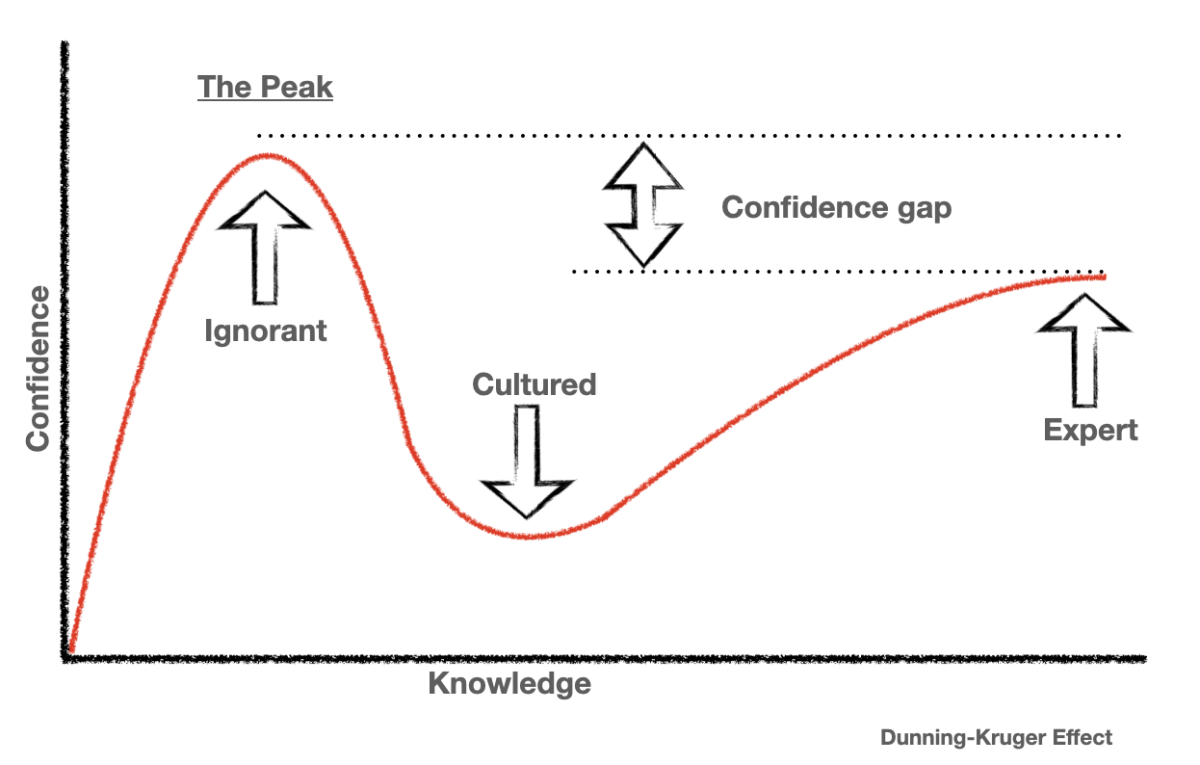How do you know what you don’t know? If you don’t know what you don’t know, how do you know that you don’t know it?
The phenomenon of a novice in a certain field overestimating their expertise is known as the Dunning-Kruger effect. Originating from a study published in 2000 titled “Unskilled and Unaware of It: How Difficulties in Recognizing One’s Own Incompetence Lead to Inflated Self-Assessment” by Justin Kruger and David Dunning, much of public awareness of self-perception regarding ability levels stems from research that had been conducted under faulty conditions and mildly misinterpreted whenever it was referenced.
The definition of the effect known in popular culture seems, generally, to be this: incompetent people fail to realize they are incompetent, resulting in inflated perceptions of ability and general overconfidence, whereas truly competent people realize how much knowledge they lack, and therefore underestimate their performance.
This is false. While some aspects of the publicly agreed upon interpretation of the effect are not completely incorrect, similar studies attempting to recreate the results found a disparity between their findings and the results many have referenced for years. The Dunning-Kruger effect does not apply only to the most incompetent people, but to everyone, regardless of ability level. Research seems to suggest more that most people think of themselves as slightly above average at various tasks, and though the ones who did worst did overestimate their performance, they did not estimate their performance to be close to that of the highest scorers.
This distinction is important because it reveals our tendency to look down upon overly confident, incompetent people and praise the humble yet skilled. It is true that there are some individuals whose egos are so inflated that they will never truly realize their ineptitude. These people are often loud and make their presence known, whereas the overwhelming majority of average people are much more accurate in identifying what they are good at and what they are not. Yet, it is not better to underestimate one’s abilities, either. Lack of confidence and self-efficacy at a task impedes motivation and self-esteem. It is healthy to know that you are skilled in several different areas, even though you may not understand absolutely all there is to know about a subject.
Also, it is not only one’s levels of competence that determine a person’s confidence. Personality traits and previous experiences can influence an individual’s perception of their own performance at a task. The steep lines of the infamous graph describing the effect can be daunting. It is a terrifying realization that you somehow deceived yourself into believing you are better in some way than you are. However, the effect at its core describes a human tendency to be generally overconfident and poor assessors of self-performance. The Dunning-Kruger effect is an us phenomenon, not a them phenomenon. It applies to everyone, though not all realize they don’t grasp the true nature of the effect, which is a sort of demonstration of the effect itself.
Sources:
https://theness.com/neurologicablog/misunderstanding-dunning-kruger/
https://www.mcgill.ca/oss/article/critical-thinking/dunning-kruger-effect-probably-not-real
https://supermemo.guru/wiki/Myth:_Dunning%E2%80%93Kruger_effect_is_a_scientific_fact








